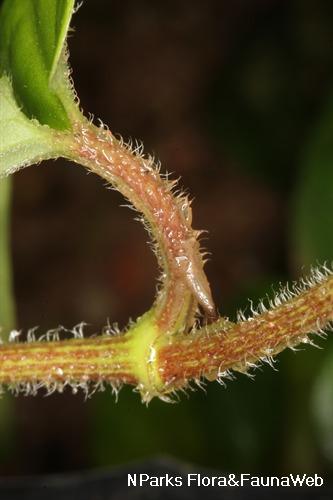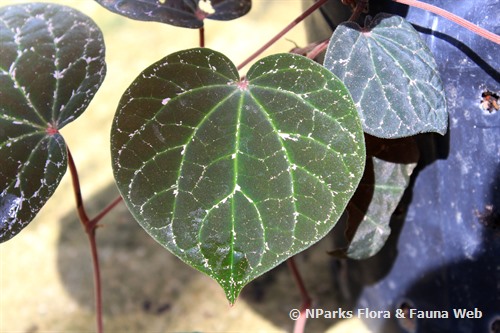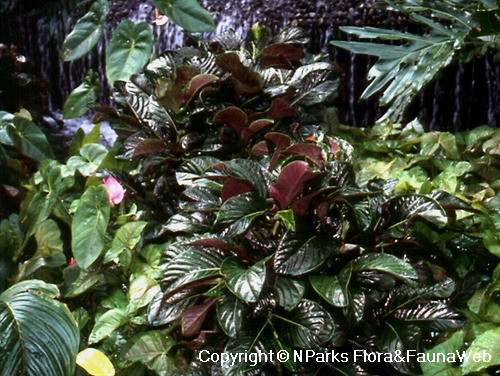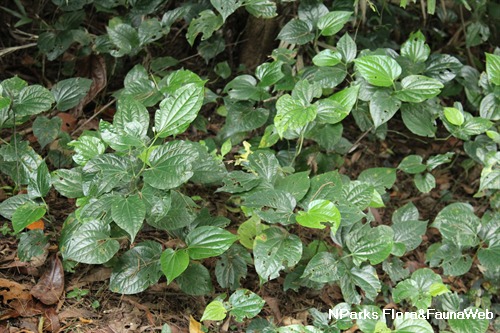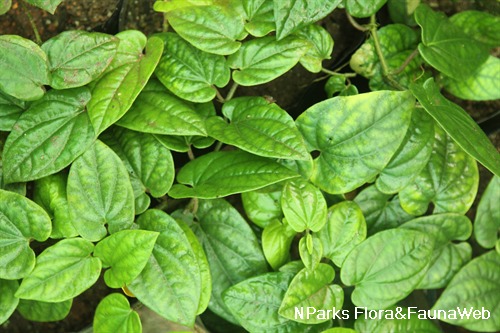
Name
Classifications and Characteristics
| Plant Division | Angiosperms (Flowering Seed Plants) (Dicotyledon) |
|---|---|
| Plant Growth Form | Climber |
| Lifespan (in Singapore) | Perennial |
| Mode of Nutrition | Autotrophic |
Biogeography
| Native Distribution | Peninsular Malaysia |
|---|---|
| Native Habitat | Terrestrial (Primary Rainforest, Secondary Rainforest) |
| Preferred Climate Zone | Tropical |
Description and Ethnobotany
| Growth Form | It is a creeper, up to 9 m long, with fine hairs on the stems and petiole when young. |
|---|---|
| Foliage | Its stalked, alternately arranged leaves are ovate elliptic, with a pointed tip and cordate base, up to 12 cm long by 5 cm wide. The leaves are hairless above, but finely hairy along the veins on the underside. The leaf stalks are densely hairy. |
| Flowers | The plant is dioecious, having separate plants that bear male or female flowers. The male flowers are borne on stalked inflorescences that are up to 7.8 cm long and becoming thinner at the tip. The female flowers are borne on longer stalked inflorescences that are up to 10.5 cm long and obtuse at the tip. |
| Fruit | Its fruits are round berries that are about 1 mm in diameter, ripening orange to dark yellow. |
| Habitat | It grows on trees in lowland forests up to 300 m above sea level. |
| Associated Fauna | Its fruits are probably eaten by birds and small mammals. |
| Cultivation | It can be propagated from seed or stem cuttings. |
| Etymology | Greek pĕpĕri, derived from pippalī, the Sanskrit name of long pepper; Latin ramipilum, hairy branches, a reference to the fine hairs on the branches of the plant. |
Landscaping Features
| Landscaping | It is suitable for growing in parks and gardens on trees in shaded areas. |
|---|---|
| Desirable Plant Features | Ornamental Foliage |
| Landscape Uses | General, Parks & Gardens, Small Gardens, Suitable for Hanging Baskets |
Fauna, Pollination and Dispersal
| Pollination Method(s) | Biotic (Fauna) |
|---|---|
| Seed or Spore Dispersal | Biotic (Fauna) |
Plant Care and Propagation
| Light Preference | Semi-Shade, Full Shade |
|---|---|
| Water Preference | Moderate Water |
| Plant Growth Rate | Fast |
| Rootzone Tolerance | Moist Soils, Well-Drained Soils, Fertile Loamy Soils, Easy to Grow |
| Transplanting Tolerance | Good |
| Maintenance Requirements | Low |
| Propagation Method | Seed, Stem Cutting |
Foliar
| Foliage Retention | Evergreen |
|---|---|
| Mature Foliage Colour(s) | Green |
| Mature Foliage Texture(s) | Hairy / Hirsute, Leathery |
| Foliar Type | Simple / Unifoliate |
| Foliar Arrangement Along Stem | Alternate |
| Foliar Attachment to Stem | Petiolate |
| Foliar Shape(s) | Non-Palm Foliage (Ovate, Elliptical, Cordate) |
| Foliar Venation | Pinnate / Net |
| Foliar Margin | Entire |
| Foliar Apex - Tip | Acuminate |
| Foliar Base | Cordate |
Floral (Angiosperm)
| Flower & Plant Sexuality | Unisexual Flowers , Dioecious |
| Flower Grouping | Cluster / Inflorescence |
|---|
| Flower Location | Axillary |
| Inflorescence Type | Spike |
Fruit, Seed and Spore
| Mature Fruit Colour(s) | Orange |
|---|---|
| Fruit Classification | Simple Fruit |
| Fruit Type | Fleshy Fruit , Non-Accessory Fruit |
Image Repository
Others
| Master ID | 31531 |
|---|---|
| Species ID | 5930 |
| Flora Disclaimer | The information in this website has been compiled from reliable sources, such as reference works on medicinal plants. It is not a substitute for medical advice or treatment and NParks does not purport to provide any medical advice. Readers should always consult his/her physician before using or consuming a plant for medicinal purposes. |

